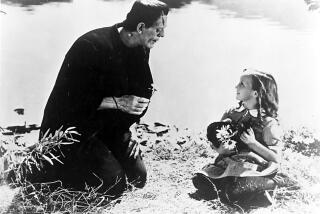Try Embracing the Miracle, Not the Misery
- Share via
“It was the best of times, it was the worst of times.” Right before giving birth to my first daughter, I came to believe that Charles Dickens’ famous phrase actually referred to pregnancy.
Most of the time, I liked everything about being pregnant--knowing that a human being was forming inside my body, feeling her move, the way people treated me as special, even the changes in my appearance. What I loved most was thinking that, just by being, I was connected to a higher purpose. If today you were to offer me a shot that replicated those emotions, I’d take it in a (baby’s) heartbeat.
And yet, I also suffered occasional moments of despair and discomfort more intense than anything in my previous experience. Fear of the unknown, uncertainty, anxiety--you name it, I fought it.
In that, I’m not unique. Most pregnant women swing between extremes of emotion, with some spending the majority of time at the happy end of the spectrum, and others stuck way over there in a quagmire of misery. For many, though, the catalyst for misery is panic over their looks: “I’m so fat. I’ll always be fat. No one will ever be attracted to me again.” I know some women who, having always been the natural foods and Birkenstock type, suddenly began planning their postpartum plastic surgery.
The reason it’s difficult to convince a pregnant woman caught in such throes that she will, at some point, get back to normal is because, well, there’s a kernel of truth to the fear. Pregnancy and childbirth do change your body. The question is, how much?
For those who have been on exercise programs before, and continue to exercise appropriately during the pregnancy, these changes can be so minor as to seem nearly invisible. But for strangers to a consistent exercise regime, the road back to a firm body is likely to be longer and bumpier.
The benefits of exercising during pregnancy are many and include an increase in endorphin production to improve your mood, more energy during the day, better sleeping at night, a sense of control over your life, and, of course, a post-pregnancy body that finds its pre-pregnancy shape faster and better. More important, your body may be better equipped to handle labor, which requires terrific muscle control.
*
Recently, the American College of Obstetricians and Gynecologists revised its guidelines for pregnant women with regard to exercise, concluding that a woman who has her physician’s authorization ought to be able to continue her regular program at great advantage to both herself and her fetus, as long as she takes certain common sense precautions (like not running on uneven ground, not becoming dehydrated and not playing football).
Some women stop exercising when pregnant because of oppressive morning sickness or fatigue. I, too, was frequently nauseated during both of my pregnancies, but discovered that moderate exercise actually lessened, if not eliminated, the awful feeling. I remember how much I looked forward to getting outdoors and walking for mile after mile. Believing that I was seeing the world through new eyes--my child’s--I would suddenly realize that the nausea was gone. And while the exercise did give me more energy, I still found myself falling asleep in unexpected places, like movies, and having to take naps. So should you. Every system in your body is being stressed, so to the degree that you can give in to the urge to sleep, give in. That might mean going to bed earlier than normal, as well as napping whenever possible.
If you do plan on beginning an exercise program while pregnant, please, please, please, consult your physician first. Then, with his or her blessing, proceed slowly and don’t push yourself, especially in the first trimester. I recommend walking three or four times a week for up to 15 minutes each session, working your way up to half an hour. Don’t try to win a speed race--three to four miles an hour is a good pace. And before and after your walk, stretch gently for a few minutes.
*
Many women discover swimming while pregnant, if for no other reason than the sense of weightlessness it provides.
Toward the end of your pregnancy, certain types of exercises can put pressure on your already-burdened back, so avoid exercises in which you have to bend forward (like walking up hills). Whether or not you choose to exercise during pregnancy, keep mindful of the fact that pregnancy is about the growth, development and ultimately the birth of a child who is an absolute miracle. As that child’s mother, you create the environment for the child. What you eat affects the baby, as do your stress level and your sleeping habits. Everything you consume, do, or feel will, in some way or another, affect that being inside you. So please choose wisely.
As you stare in the mirror, stand on the scale, rub your aching back and dart for the bathroom every few minutes to relieve your bladder, try to remember that billions of women before you were in your position. You can choose to embrace this pregnancy as the miracle it is, or be repulsed by some of its less appealing effects on your body.
I encourage you to look for the miracle.
Copyright 1998 by Kathy Smith
*
Kathy Smith’s fitness column appears weekly in Health. Reader questions are welcome and can be sent to Kathy Smith, Health, Los Angeles Times, Times Mirror Square, Los Angeles, CA 90053. If your question is selected, you will receive a free copy of her book “Getting Better All the Time.” Please include your name, address and a daytime phone number with your question.


